The Significance of Verbal Communication in Leadership Management
VerifiedAdded on 2022/11/29
|8
|1817
|167
Essay
AI Summary
This essay delves into the critical role of verbal communication skills within a management context. It emphasizes how effective verbal interaction is fundamental for managerial tasks, organizational efficiency, and fostering positive interpersonal relationships among employees. The essay highlights the importance of clear, accurate, and timely communication in preventing organizational issues and facilitating employee engagement. It explores the characteristics and quality of straightforward and transparent verbal communication, particularly in the context of business management. The rationale focuses on illustrating the significance of verbal communication skills for enhancing interpersonal communication within a management organization, with the objective of increasing organizational efficiency and enriching services to clients. The essay further examines the usage of these skills across various scenarios, including interactions with diverse individuals and groups, and underscores their relevance for both executives and staff in achieving organizational objectives. Finally, it presents a comprehensive list of references supporting the arguments presented.
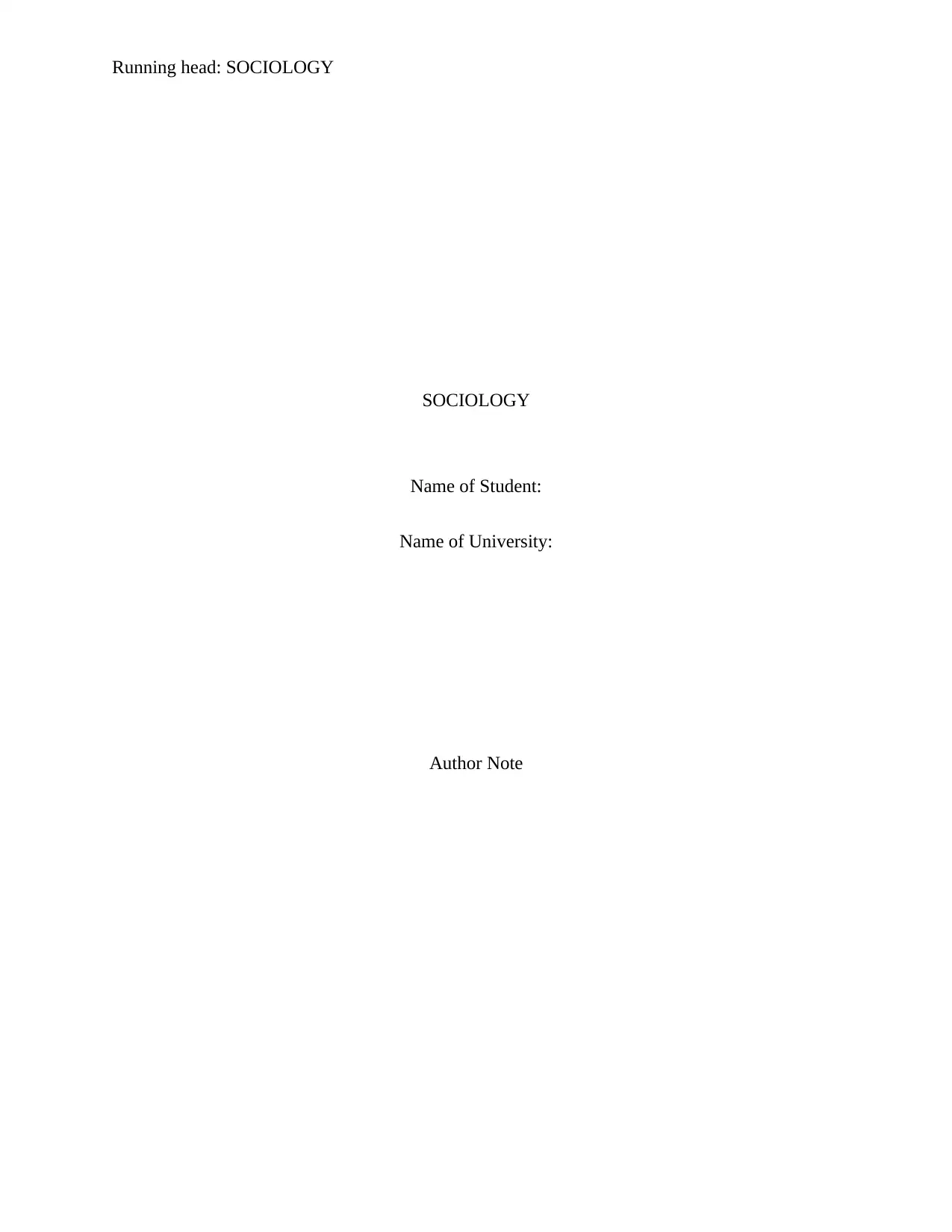
Running head: SOCIOLOGY
SOCIOLOGY
Name of Student:
Name of University:
Author Note
SOCIOLOGY
Name of Student:
Name of University:
Author Note
Paraphrase This Document
Need a fresh take? Get an instant paraphrase of this document with our AI Paraphraser
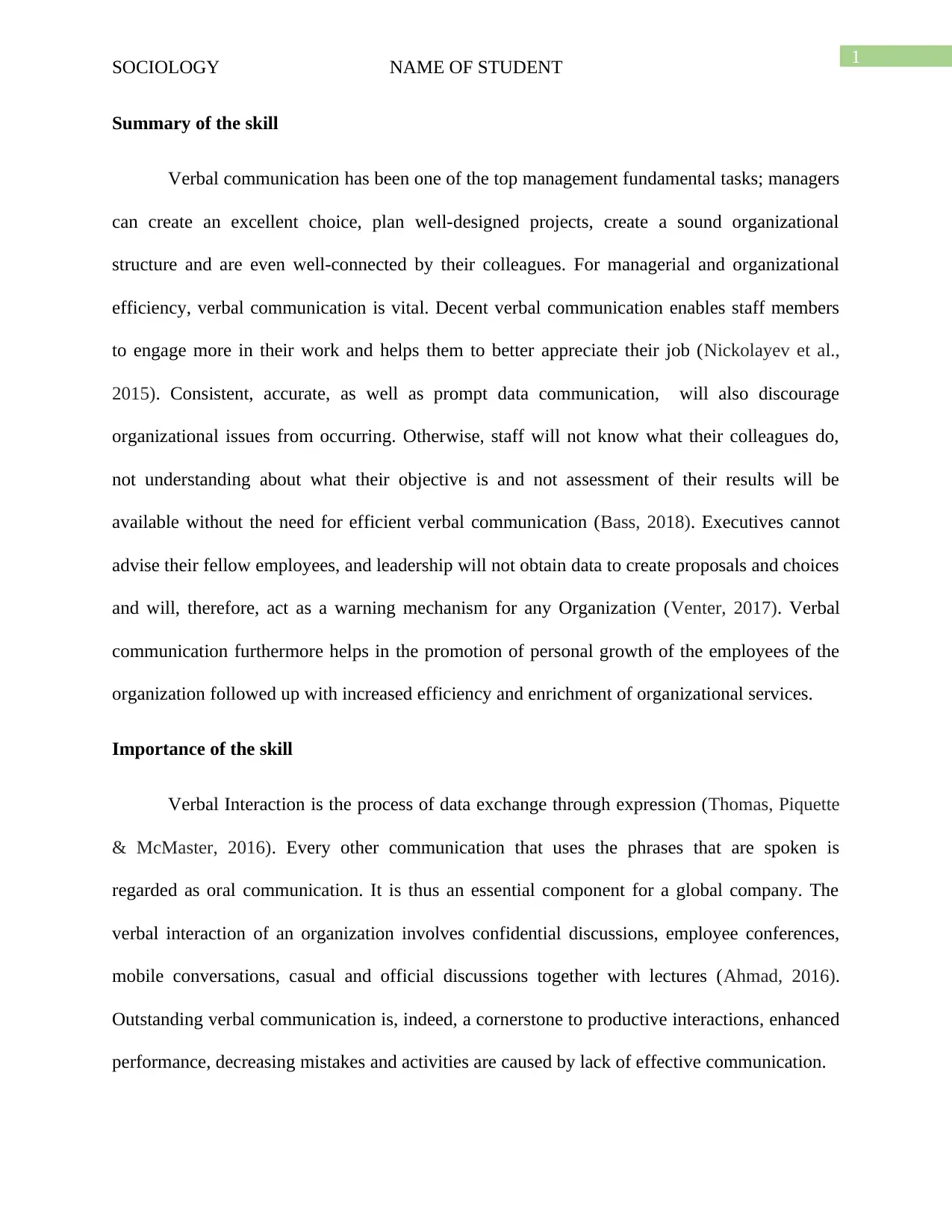
1
SOCIOLOGY NAME OF STUDENT
Summary of the skill
Verbal communication has been one of the top management fundamental tasks; managers
can create an excellent choice, plan well-designed projects, create a sound organizational
structure and are even well-connected by their colleagues. For managerial and organizational
efficiency, verbal communication is vital. Decent verbal communication enables staff members
to engage more in their work and helps them to better appreciate their job (Nickolayev et al.,
2015). Consistent, accurate, as well as prompt data communication, will also discourage
organizational issues from occurring. Otherwise, staff will not know what their colleagues do,
not understanding about what their objective is and not assessment of their results will be
available without the need for efficient verbal communication (Bass, 2018). Executives cannot
advise their fellow employees, and leadership will not obtain data to create proposals and choices
and will, therefore, act as a warning mechanism for any Organization (Venter, 2017). Verbal
communication furthermore helps in the promotion of personal growth of the employees of the
organization followed up with increased efficiency and enrichment of organizational services.
Importance of the skill
Verbal Interaction is the process of data exchange through expression (Thomas, Piquette
& McMaster, 2016). Every other communication that uses the phrases that are spoken is
regarded as oral communication. It is thus an essential component for a global company. The
verbal interaction of an organization involves confidential discussions, employee conferences,
mobile conversations, casual and official discussions together with lectures (Ahmad, 2016).
Outstanding verbal communication is, indeed, a cornerstone to productive interactions, enhanced
performance, decreasing mistakes and activities are caused by lack of effective communication.
SOCIOLOGY NAME OF STUDENT
Summary of the skill
Verbal communication has been one of the top management fundamental tasks; managers
can create an excellent choice, plan well-designed projects, create a sound organizational
structure and are even well-connected by their colleagues. For managerial and organizational
efficiency, verbal communication is vital. Decent verbal communication enables staff members
to engage more in their work and helps them to better appreciate their job (Nickolayev et al.,
2015). Consistent, accurate, as well as prompt data communication, will also discourage
organizational issues from occurring. Otherwise, staff will not know what their colleagues do,
not understanding about what their objective is and not assessment of their results will be
available without the need for efficient verbal communication (Bass, 2018). Executives cannot
advise their fellow employees, and leadership will not obtain data to create proposals and choices
and will, therefore, act as a warning mechanism for any Organization (Venter, 2017). Verbal
communication furthermore helps in the promotion of personal growth of the employees of the
organization followed up with increased efficiency and enrichment of organizational services.
Importance of the skill
Verbal Interaction is the process of data exchange through expression (Thomas, Piquette
& McMaster, 2016). Every other communication that uses the phrases that are spoken is
regarded as oral communication. It is thus an essential component for a global company. The
verbal interaction of an organization involves confidential discussions, employee conferences,
mobile conversations, casual and official discussions together with lectures (Ahmad, 2016).
Outstanding verbal communication is, indeed, a cornerstone to productive interactions, enhanced
performance, decreasing mistakes and activities are caused by lack of effective communication.
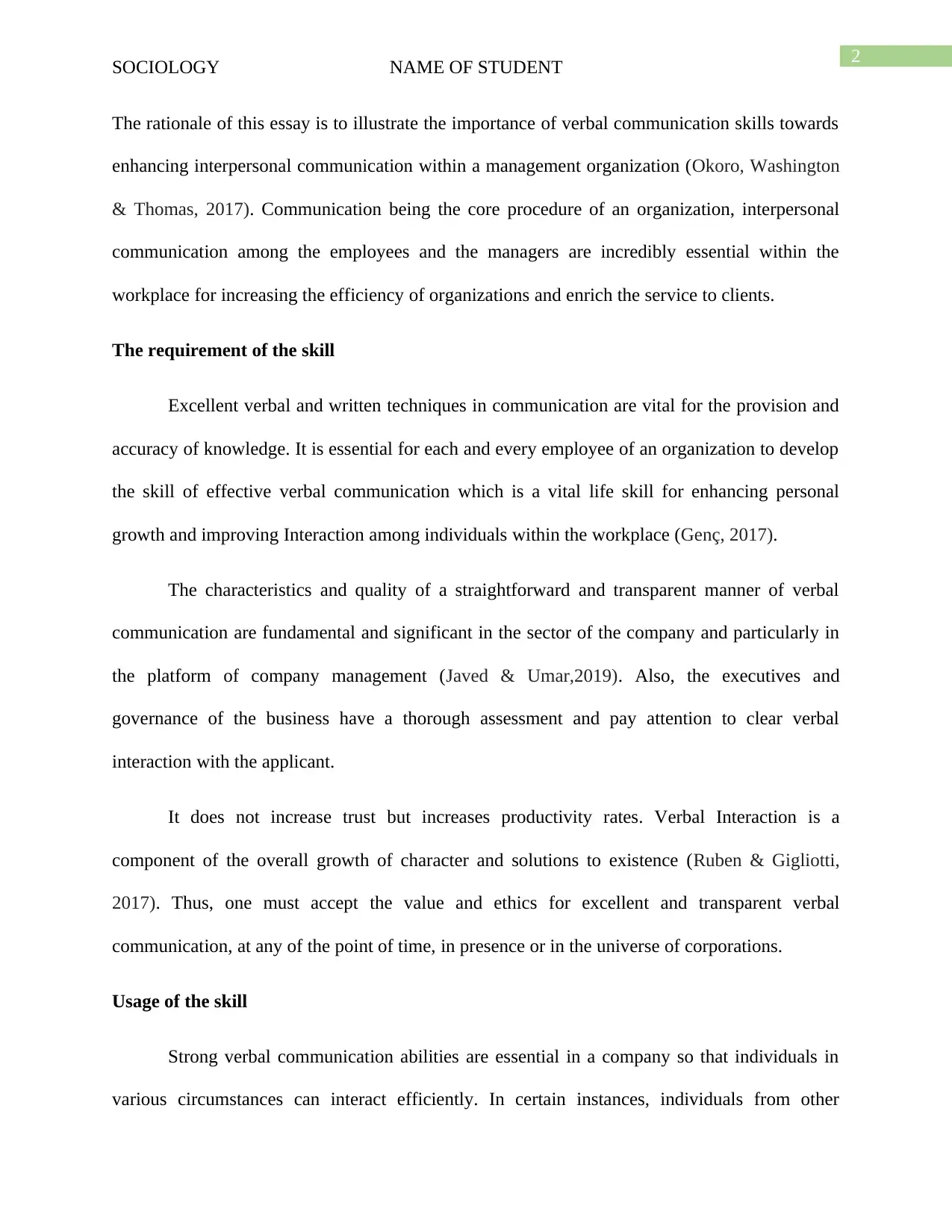
2
SOCIOLOGY NAME OF STUDENT
The rationale of this essay is to illustrate the importance of verbal communication skills towards
enhancing interpersonal communication within a management organization (Okoro, Washington
& Thomas, 2017). Communication being the core procedure of an organization, interpersonal
communication among the employees and the managers are incredibly essential within the
workplace for increasing the efficiency of organizations and enrich the service to clients.
The requirement of the skill
Excellent verbal and written techniques in communication are vital for the provision and
accuracy of knowledge. It is essential for each and every employee of an organization to develop
the skill of effective verbal communication which is a vital life skill for enhancing personal
growth and improving Interaction among individuals within the workplace (Genç, 2017).
The characteristics and quality of a straightforward and transparent manner of verbal
communication are fundamental and significant in the sector of the company and particularly in
the platform of company management (Javed & Umar,2019). Also, the executives and
governance of the business have a thorough assessment and pay attention to clear verbal
interaction with the applicant.
It does not increase trust but increases productivity rates. Verbal Interaction is a
component of the overall growth of character and solutions to existence (Ruben & Gigliotti,
2017). Thus, one must accept the value and ethics for excellent and transparent verbal
communication, at any of the point of time, in presence or in the universe of corporations.
Usage of the skill
Strong verbal communication abilities are essential in a company so that individuals in
various circumstances can interact efficiently. In certain instances, individuals from other
SOCIOLOGY NAME OF STUDENT
The rationale of this essay is to illustrate the importance of verbal communication skills towards
enhancing interpersonal communication within a management organization (Okoro, Washington
& Thomas, 2017). Communication being the core procedure of an organization, interpersonal
communication among the employees and the managers are incredibly essential within the
workplace for increasing the efficiency of organizations and enrich the service to clients.
The requirement of the skill
Excellent verbal and written techniques in communication are vital for the provision and
accuracy of knowledge. It is essential for each and every employee of an organization to develop
the skill of effective verbal communication which is a vital life skill for enhancing personal
growth and improving Interaction among individuals within the workplace (Genç, 2017).
The characteristics and quality of a straightforward and transparent manner of verbal
communication are fundamental and significant in the sector of the company and particularly in
the platform of company management (Javed & Umar,2019). Also, the executives and
governance of the business have a thorough assessment and pay attention to clear verbal
interaction with the applicant.
It does not increase trust but increases productivity rates. Verbal Interaction is a
component of the overall growth of character and solutions to existence (Ruben & Gigliotti,
2017). Thus, one must accept the value and ethics for excellent and transparent verbal
communication, at any of the point of time, in presence or in the universe of corporations.
Usage of the skill
Strong verbal communication abilities are essential in a company so that individuals in
various circumstances can interact efficiently. In certain instances, individuals from other
⊘ This is a preview!⊘
Do you want full access?
Subscribe today to unlock all pages.

Trusted by 1+ million students worldwide
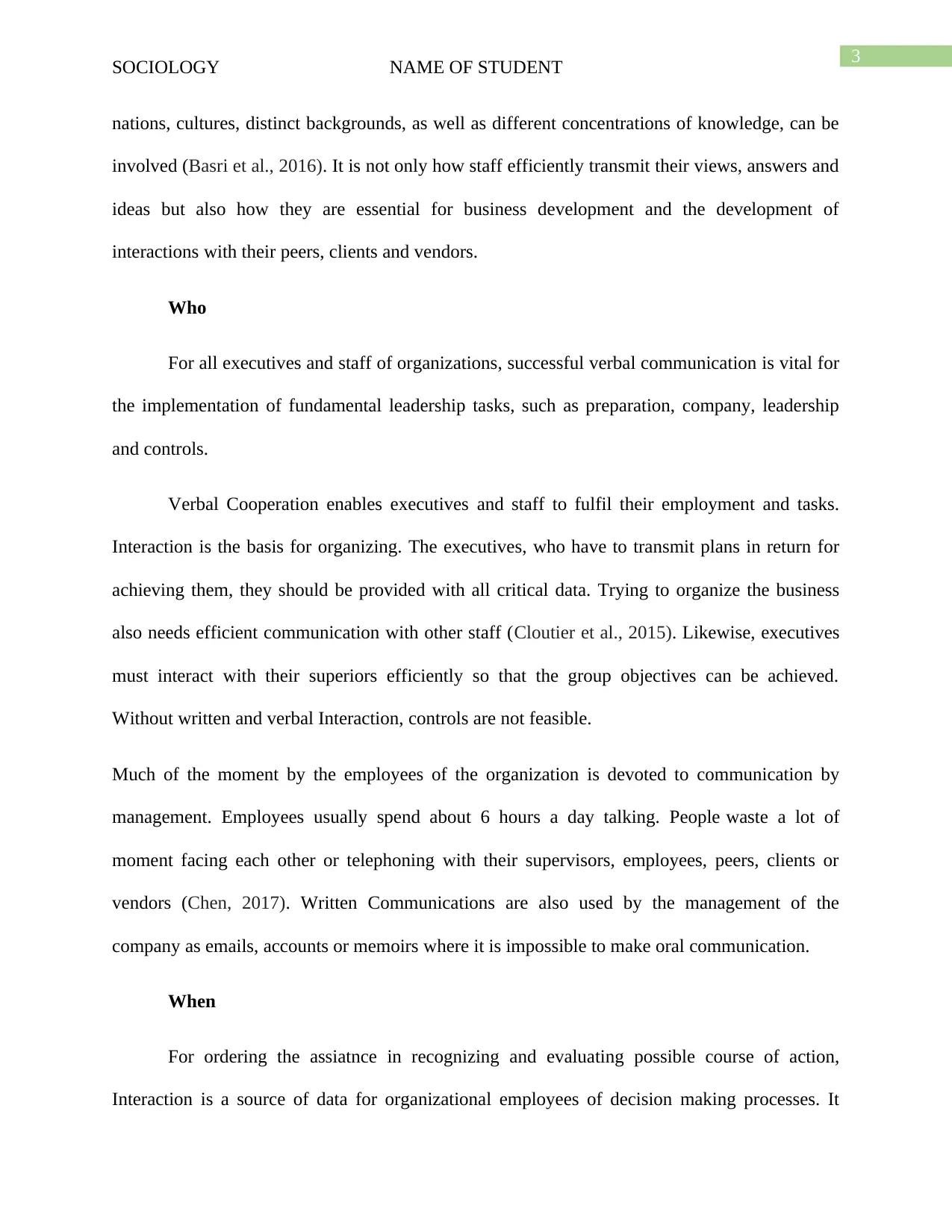
3
SOCIOLOGY NAME OF STUDENT
nations, cultures, distinct backgrounds, as well as different concentrations of knowledge, can be
involved (Basri et al., 2016). It is not only how staff efficiently transmit their views, answers and
ideas but also how they are essential for business development and the development of
interactions with their peers, clients and vendors.
Who
For all executives and staff of organizations, successful verbal communication is vital for
the implementation of fundamental leadership tasks, such as preparation, company, leadership
and controls.
Verbal Cooperation enables executives and staff to fulfil their employment and tasks.
Interaction is the basis for organizing. The executives, who have to transmit plans in return for
achieving them, they should be provided with all critical data. Trying to organize the business
also needs efficient communication with other staff (Cloutier et al., 2015). Likewise, executives
must interact with their superiors efficiently so that the group objectives can be achieved.
Without written and verbal Interaction, controls are not feasible.
Much of the moment by the employees of the organization is devoted to communication by
management. Employees usually spend about 6 hours a day talking. People waste a lot of
moment facing each other or telephoning with their supervisors, employees, peers, clients or
vendors (Chen, 2017). Written Communications are also used by the management of the
company as emails, accounts or memoirs where it is impossible to make oral communication.
When
For ordering the assiatnce in recognizing and evaluating possible course of action,
Interaction is a source of data for organizational employees of decision making processes. It
SOCIOLOGY NAME OF STUDENT
nations, cultures, distinct backgrounds, as well as different concentrations of knowledge, can be
involved (Basri et al., 2016). It is not only how staff efficiently transmit their views, answers and
ideas but also how they are essential for business development and the development of
interactions with their peers, clients and vendors.
Who
For all executives and staff of organizations, successful verbal communication is vital for
the implementation of fundamental leadership tasks, such as preparation, company, leadership
and controls.
Verbal Cooperation enables executives and staff to fulfil their employment and tasks.
Interaction is the basis for organizing. The executives, who have to transmit plans in return for
achieving them, they should be provided with all critical data. Trying to organize the business
also needs efficient communication with other staff (Cloutier et al., 2015). Likewise, executives
must interact with their superiors efficiently so that the group objectives can be achieved.
Without written and verbal Interaction, controls are not feasible.
Much of the moment by the employees of the organization is devoted to communication by
management. Employees usually spend about 6 hours a day talking. People waste a lot of
moment facing each other or telephoning with their supervisors, employees, peers, clients or
vendors (Chen, 2017). Written Communications are also used by the management of the
company as emails, accounts or memoirs where it is impossible to make oral communication.
When
For ordering the assiatnce in recognizing and evaluating possible course of action,
Interaction is a source of data for organizational employees of decision making processes. It
Paraphrase This Document
Need a fresh take? Get an instant paraphrase of this document with our AI Paraphraser
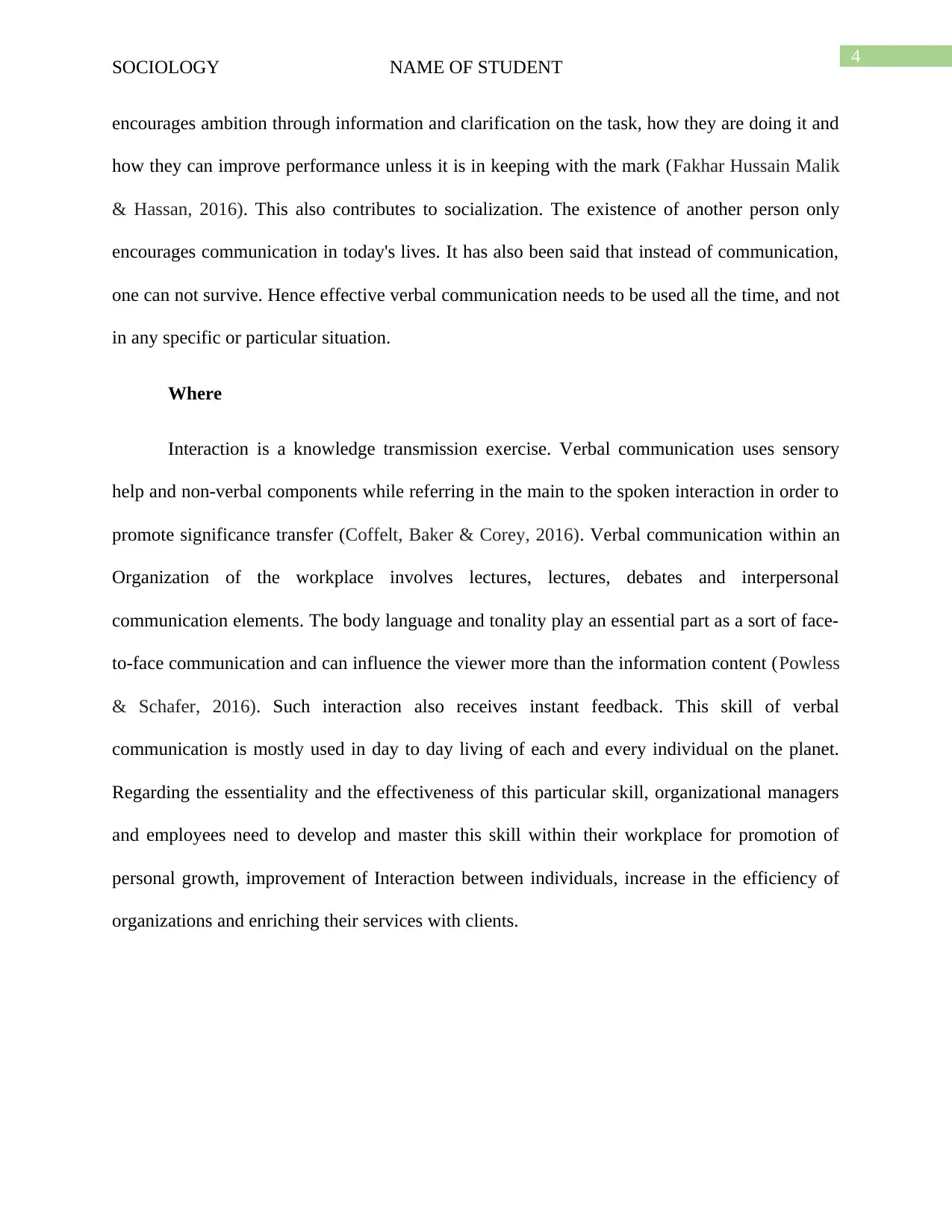
4
SOCIOLOGY NAME OF STUDENT
encourages ambition through information and clarification on the task, how they are doing it and
how they can improve performance unless it is in keeping with the mark (Fakhar Hussain Malik
& Hassan, 2016). This also contributes to socialization. The existence of another person only
encourages communication in today's lives. It has also been said that instead of communication,
one can not survive. Hence effective verbal communication needs to be used all the time, and not
in any specific or particular situation.
Where
Interaction is a knowledge transmission exercise. Verbal communication uses sensory
help and non-verbal components while referring in the main to the spoken interaction in order to
promote significance transfer (Coffelt, Baker & Corey, 2016). Verbal communication within an
Organization of the workplace involves lectures, lectures, debates and interpersonal
communication elements. The body language and tonality play an essential part as a sort of face-
to-face communication and can influence the viewer more than the information content (Powless
& Schafer, 2016). Such interaction also receives instant feedback. This skill of verbal
communication is mostly used in day to day living of each and every individual on the planet.
Regarding the essentiality and the effectiveness of this particular skill, organizational managers
and employees need to develop and master this skill within their workplace for promotion of
personal growth, improvement of Interaction between individuals, increase in the efficiency of
organizations and enriching their services with clients.
SOCIOLOGY NAME OF STUDENT
encourages ambition through information and clarification on the task, how they are doing it and
how they can improve performance unless it is in keeping with the mark (Fakhar Hussain Malik
& Hassan, 2016). This also contributes to socialization. The existence of another person only
encourages communication in today's lives. It has also been said that instead of communication,
one can not survive. Hence effective verbal communication needs to be used all the time, and not
in any specific or particular situation.
Where
Interaction is a knowledge transmission exercise. Verbal communication uses sensory
help and non-verbal components while referring in the main to the spoken interaction in order to
promote significance transfer (Coffelt, Baker & Corey, 2016). Verbal communication within an
Organization of the workplace involves lectures, lectures, debates and interpersonal
communication elements. The body language and tonality play an essential part as a sort of face-
to-face communication and can influence the viewer more than the information content (Powless
& Schafer, 2016). Such interaction also receives instant feedback. This skill of verbal
communication is mostly used in day to day living of each and every individual on the planet.
Regarding the essentiality and the effectiveness of this particular skill, organizational managers
and employees need to develop and master this skill within their workplace for promotion of
personal growth, improvement of Interaction between individuals, increase in the efficiency of
organizations and enriching their services with clients.
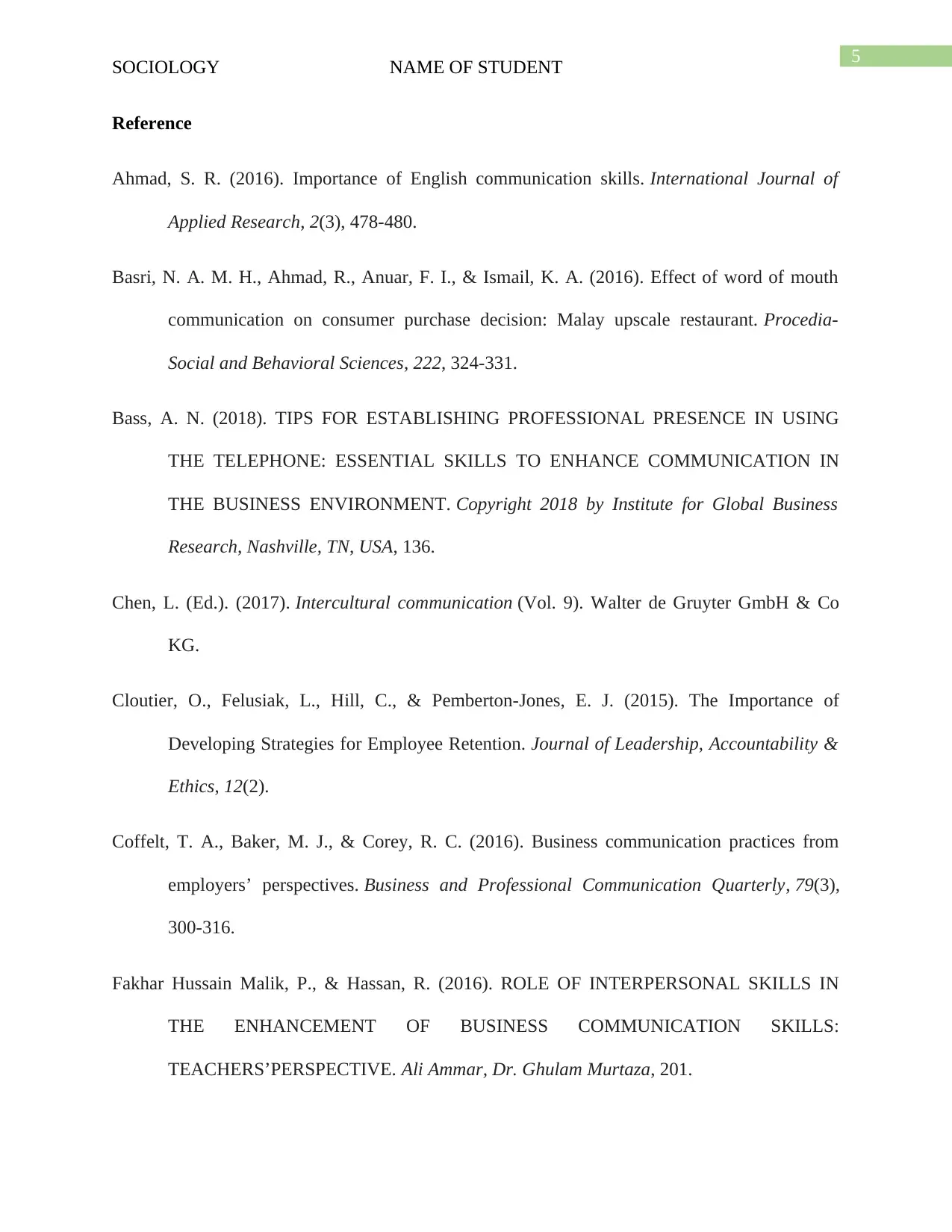
5
SOCIOLOGY NAME OF STUDENT
Reference
Ahmad, S. R. (2016). Importance of English communication skills. International Journal of
Applied Research, 2(3), 478-480.
Basri, N. A. M. H., Ahmad, R., Anuar, F. I., & Ismail, K. A. (2016). Effect of word of mouth
communication on consumer purchase decision: Malay upscale restaurant. Procedia-
Social and Behavioral Sciences, 222, 324-331.
Bass, A. N. (2018). TIPS FOR ESTABLISHING PROFESSIONAL PRESENCE IN USING
THE TELEPHONE: ESSENTIAL SKILLS TO ENHANCE COMMUNICATION IN
THE BUSINESS ENVIRONMENT. Copyright 2018 by Institute for Global Business
Research, Nashville, TN, USA, 136.
Chen, L. (Ed.). (2017). Intercultural communication (Vol. 9). Walter de Gruyter GmbH & Co
KG.
Cloutier, O., Felusiak, L., Hill, C., & Pemberton-Jones, E. J. (2015). The Importance of
Developing Strategies for Employee Retention. Journal of Leadership, Accountability &
Ethics, 12(2).
Coffelt, T. A., Baker, M. J., & Corey, R. C. (2016). Business communication practices from
employers’ perspectives. Business and Professional Communication Quarterly, 79(3),
300-316.
Fakhar Hussain Malik, P., & Hassan, R. (2016). ROLE OF INTERPERSONAL SKILLS IN
THE ENHANCEMENT OF BUSINESS COMMUNICATION SKILLS:
TEACHERS’PERSPECTIVE. Ali Ammar, Dr. Ghulam Murtaza, 201.
SOCIOLOGY NAME OF STUDENT
Reference
Ahmad, S. R. (2016). Importance of English communication skills. International Journal of
Applied Research, 2(3), 478-480.
Basri, N. A. M. H., Ahmad, R., Anuar, F. I., & Ismail, K. A. (2016). Effect of word of mouth
communication on consumer purchase decision: Malay upscale restaurant. Procedia-
Social and Behavioral Sciences, 222, 324-331.
Bass, A. N. (2018). TIPS FOR ESTABLISHING PROFESSIONAL PRESENCE IN USING
THE TELEPHONE: ESSENTIAL SKILLS TO ENHANCE COMMUNICATION IN
THE BUSINESS ENVIRONMENT. Copyright 2018 by Institute for Global Business
Research, Nashville, TN, USA, 136.
Chen, L. (Ed.). (2017). Intercultural communication (Vol. 9). Walter de Gruyter GmbH & Co
KG.
Cloutier, O., Felusiak, L., Hill, C., & Pemberton-Jones, E. J. (2015). The Importance of
Developing Strategies for Employee Retention. Journal of Leadership, Accountability &
Ethics, 12(2).
Coffelt, T. A., Baker, M. J., & Corey, R. C. (2016). Business communication practices from
employers’ perspectives. Business and Professional Communication Quarterly, 79(3),
300-316.
Fakhar Hussain Malik, P., & Hassan, R. (2016). ROLE OF INTERPERSONAL SKILLS IN
THE ENHANCEMENT OF BUSINESS COMMUNICATION SKILLS:
TEACHERS’PERSPECTIVE. Ali Ammar, Dr. Ghulam Murtaza, 201.
⊘ This is a preview!⊘
Do you want full access?
Subscribe today to unlock all pages.

Trusted by 1+ million students worldwide
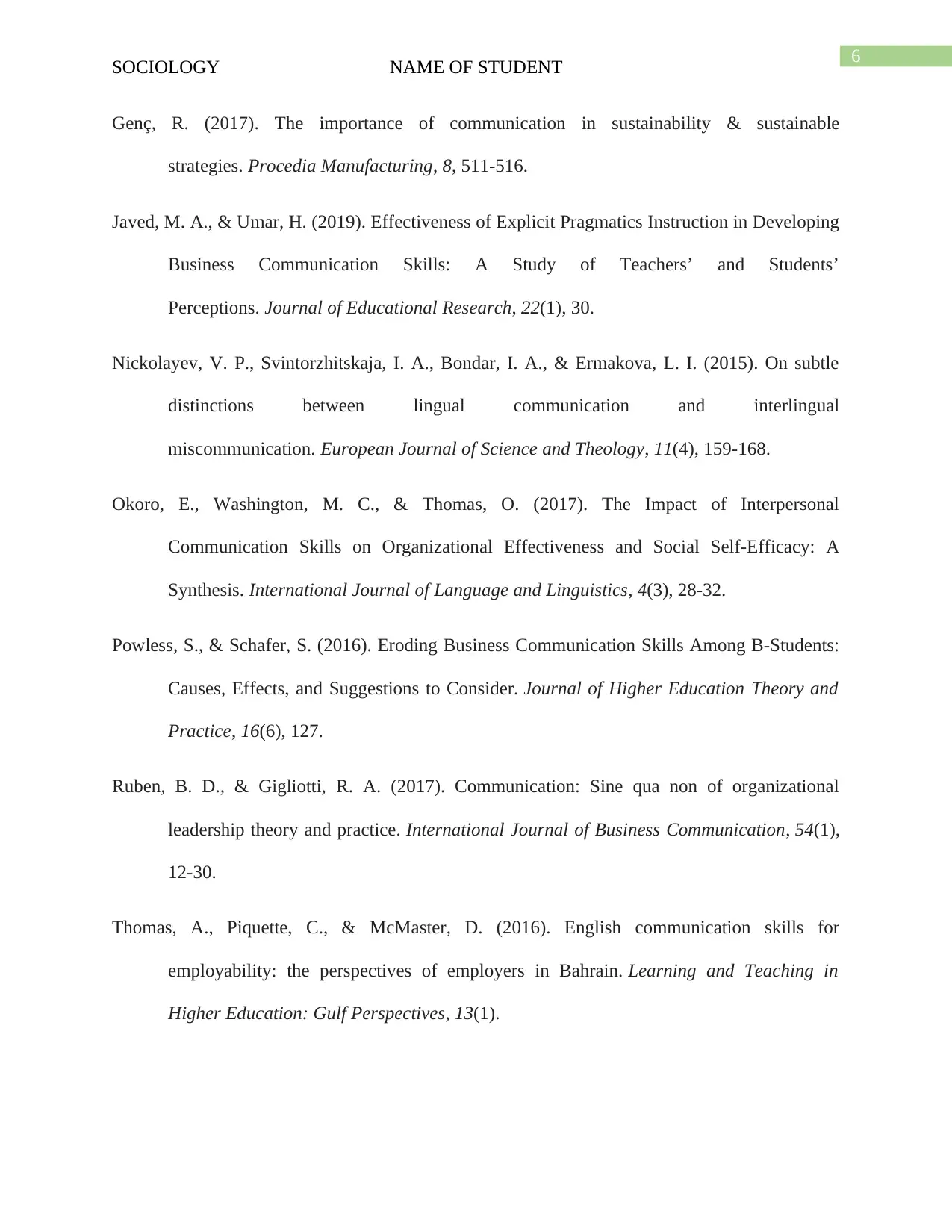
6
SOCIOLOGY NAME OF STUDENT
Genç, R. (2017). The importance of communication in sustainability & sustainable
strategies. Procedia Manufacturing, 8, 511-516.
Javed, M. A., & Umar, H. (2019). Effectiveness of Explicit Pragmatics Instruction in Developing
Business Communication Skills: A Study of Teachers’ and Students’
Perceptions. Journal of Educational Research, 22(1), 30.
Nickolayev, V. P., Svintorzhitskaja, I. A., Bondar, I. A., & Ermakova, L. I. (2015). On subtle
distinctions between lingual communication and interlingual
miscommunication. European Journal of Science and Theology, 11(4), 159-168.
Okoro, E., Washington, M. C., & Thomas, O. (2017). The Impact of Interpersonal
Communication Skills on Organizational Effectiveness and Social Self-Efficacy: A
Synthesis. International Journal of Language and Linguistics, 4(3), 28-32.
Powless, S., & Schafer, S. (2016). Eroding Business Communication Skills Among B-Students:
Causes, Effects, and Suggestions to Consider. Journal of Higher Education Theory and
Practice, 16(6), 127.
Ruben, B. D., & Gigliotti, R. A. (2017). Communication: Sine qua non of organizational
leadership theory and practice. International Journal of Business Communication, 54(1),
12-30.
Thomas, A., Piquette, C., & McMaster, D. (2016). English communication skills for
employability: the perspectives of employers in Bahrain. Learning and Teaching in
Higher Education: Gulf Perspectives, 13(1).
SOCIOLOGY NAME OF STUDENT
Genç, R. (2017). The importance of communication in sustainability & sustainable
strategies. Procedia Manufacturing, 8, 511-516.
Javed, M. A., & Umar, H. (2019). Effectiveness of Explicit Pragmatics Instruction in Developing
Business Communication Skills: A Study of Teachers’ and Students’
Perceptions. Journal of Educational Research, 22(1), 30.
Nickolayev, V. P., Svintorzhitskaja, I. A., Bondar, I. A., & Ermakova, L. I. (2015). On subtle
distinctions between lingual communication and interlingual
miscommunication. European Journal of Science and Theology, 11(4), 159-168.
Okoro, E., Washington, M. C., & Thomas, O. (2017). The Impact of Interpersonal
Communication Skills on Organizational Effectiveness and Social Self-Efficacy: A
Synthesis. International Journal of Language and Linguistics, 4(3), 28-32.
Powless, S., & Schafer, S. (2016). Eroding Business Communication Skills Among B-Students:
Causes, Effects, and Suggestions to Consider. Journal of Higher Education Theory and
Practice, 16(6), 127.
Ruben, B. D., & Gigliotti, R. A. (2017). Communication: Sine qua non of organizational
leadership theory and practice. International Journal of Business Communication, 54(1),
12-30.
Thomas, A., Piquette, C., & McMaster, D. (2016). English communication skills for
employability: the perspectives of employers in Bahrain. Learning and Teaching in
Higher Education: Gulf Perspectives, 13(1).
Paraphrase This Document
Need a fresh take? Get an instant paraphrase of this document with our AI Paraphraser

7
SOCIOLOGY NAME OF STUDENT
Venter, E. (2017). Bridging the communication gap between Generation Y and the Baby Boomer
generation. International journal of Adolescence and Youth, 22(4), 497-507.
SOCIOLOGY NAME OF STUDENT
Venter, E. (2017). Bridging the communication gap between Generation Y and the Baby Boomer
generation. International journal of Adolescence and Youth, 22(4), 497-507.
1 out of 8
Related Documents
Your All-in-One AI-Powered Toolkit for Academic Success.
+13062052269
info@desklib.com
Available 24*7 on WhatsApp / Email
![[object Object]](/_next/static/media/star-bottom.7253800d.svg)
Unlock your academic potential
Copyright © 2020–2026 A2Z Services. All Rights Reserved. Developed and managed by ZUCOL.




